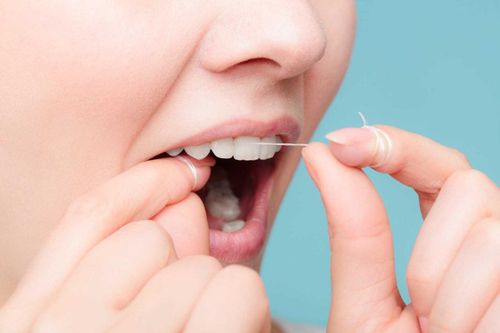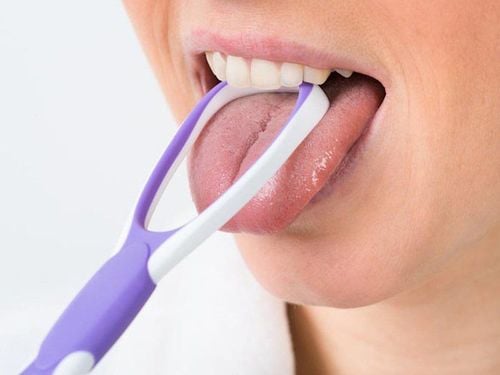This is an automatically translated article.
Many people experience bleeding gums during brushing or flossing, but people often ignore and ignore it because they think it's just a normal phenomenon. However, repeated bleeding gums can be a sign that you have dental problems. Good oral hygiene and the home remedies below can help treat and prevent bleeding gums.
1. Causes of bleeding gums
Bleeding gums is quite common and usually not serious. You may notice some blood after brushing or flossing, as this cleaning can irritate sensitive gums.
Factors like brushing too hard, trauma, pregnancy and gingivitis can contribute to bleeding gums. Gingivitis can cause red, swollen, painful gums and it can be a sign of periodontal disease. Such diseases can occur because you do not remove plaque from your teeth properly.
Determining the cause of bleeding gums is an important factor in determining the most appropriate treatment. Once you know the cause, you can choose one of the ways below to stop the bleeding.
2. Home remedies for bleeding gums
2.1. Use gauze to stop bleeding
Just like when you have bleeding anywhere else on your body, you can stop the bleeding by immediately holding a clean, damp gauze over the bleeding area. People with weakened immune systems or another medical condition may find their gums take a long time to stop bleeding.
2.2. Cold compress
Bleeding gums is not always caused by gum disease, but can be caused by dental trauma or trauma to gum tissue. Applying a cold compress to the gum line can reduce swelling and limit bleeding. Applying ice can also help soothe minor mouth sores that cause swelling, such as cuts and scrapes. Ice can also help relieve pain and swelling caused by gingivitis.
2.3. Use mouthwash
Antibacterial mouthwash both treat and prevent bleeding gums. They help kill bacteria and reduce inflammation, and can treat and prevent gingivitis, a common cause of bleeding gums. Common active ingredients in mouthwash include: chlorohexidine or hydrogen peroxide.

Nước súc miệng kháng khuẩn vừa có tác dụng điều trị vừa ngăn ngừa chảy máu nướu răng
2.4. Gargle with salt water
Regularly rinsing your mouth with warm salt water helps reduce bacteria and stop bleeding gums. You can mix half a teaspoon of salt in a cup of warm water and gargle for a few seconds three to four times a day. If you have bleeding gums from an injury, gargling with warm salt water also helps keep your mouth clean and clears out bacteria that can cause infection.
2.5. Practice good oral hygiene
Bleeding gums is a sign of poor oral hygiene practices. Gingivitis and bleeding can occur when plaque builds up along the gum line. If you don't brush or floss properly, bacteria can spread and cause tooth decay or gum disease.
To improve oral hygiene, brush your teeth at least twice daily and floss once a day. Maintaining good oral hygiene is also important for pregnant women. The change in hormone levels during pregnancy can also cause gum disease and bleeding gums.
2.6. Use the right toothbrush
If a person has sensitive gums, they can choose a toothbrush labeled as super soft or for sensitive teeth. As recommended, people should use a toothbrush with soft bristles to brush for 2 minutes, brushing twice a day. Experts say that both manual toothbrushes and electric toothbrushes are effective. Remember, replace your toothbrush every 3 months, or sooner if the bristles are frayed.
2.7. Stop smoking
Besides increasing the risk of lung cancer, heart disease and stroke, smoking has been linked to gum disease. Smoking can weaken the body's immune system, reducing its ability to fight plaque bacteria. Talk to your doctor about the best method to help you quit smoking.
2.8. Reduce stress levels
Many studies show a link between periodontal disease and stress. According to researchers, stress has a negative effect on the immune system, weakening the body's defenses against gum infections. In addition, it is believed that stress can also cause some people to neglect their oral health, which can contribute to plaque buildup.

Tăng lượng vitamin C cho cơ thể giúp chống lại nhiễm trùng nướu gây chảy máu nướu răng
2.9. Increase the amount of vitamin C in the body
Supplementing with vitamin C helps strengthen the body's immune system and helps fight gum infections that cause bleeding gums. Conversely, a vitamin C deficiency can worsen bleeding if you have gum disease. In fact, a vitamin C deficiency can also lead to bleeding gums even when you practice good oral hygiene habits. Foods rich in vitamin C include: oranges, sweet potatoes, red peppers, carrots.
2.10. Increase vitamin K intake
Getting enough Vitamin K in your diet can also reduce bleeding gums. Vitamin K is important because it helps with blood clotting. A vitamin K deficiency can cause easy bleeding and one study has found that it can lead to bleeding gums. Foods rich in vitamin K include: spinach, kale, mustard,...
2.11. Limit foods high in sugar, starch and carbs
Many studies have found that reducing your carbohydrate intake can also improve gum health and prevent gum disease. Carbohydrates and sugary foods increase plaque and bacterial growth. The more plaque that builds up on your gums, the more likely you are to have bleeding gums. Although regular brushing and flossing can reduce this buildup, cutting carbs also helps prevent plaque formation.
Eating starchy processed foods too often can cause gingivitis and bleeding gums. Starchy foods can stick to your gums and break down into sugar. This can lead to gingivitis, bleeding, and increased tooth decay. Processed, starchy foods include refined breads, cakes, cookies, and chips.
2.12. Drink green tea
Daily intake of green tea has been shown to reverse periodontal disease and help stop bleeding. The catechin in green tea is a natural antioxidant that can reduce the body's inflammatory response to bacteria in the mouth.
3. When to see a doctor?
You need to see a dentist if bleeding gums do not improve within 7 to 10 days. You may need a dental visit to remove plaque and tartar and promote gum healing. Vitamin deficiencies such as vitamins C and K, pregnancy, and certain medical conditions can also contribute to bleeding gums. Your doctor may also order tests to check for any vitamin deficiencies that could be causing bleeding gums.
With many years of experience in the examination and treatment of oral and maxillofacial diseases, now Vinmec International General Hospital has become one of the major health care centers, capable of examining and screening filtering and treating many diseases in depth. Therefore, if there are signs of bleeding gums that do not go away or other oral diseases, you can go to Vinmec International General Hospital to examine and receive support and advice from doctors and other dental professionals. health expert.
Please dial HOTLINE for more information or register for an appointment HERE. Download MyVinmec app to make appointments faster and to manage your bookings easily.
References: healthline.com, medicalnewstoday.com, webmd.com













